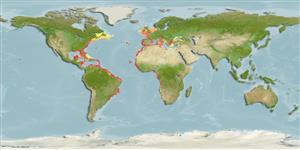Common names from other countries
分类 / Names
俗名 | 同种异名 | Catalog of Fishes(属, 种) | ITIS | CoL | WoRMS | Cloffa
Teleostei >
Scombriformes (Mackerels) >
Scombridae (Mackerels, tunas, bonitos) > Scombrinae
Etymology: Euthynnus: Greek, eu = good + Greek, thynnos = tunna (Ref. 45335).
More on author: Rafinesque.
Environment: milieu / climate zone / depth range / distribution range
生态学
海洋; 半咸淡水; 海洋洄游的 (Ref. 51243); 深度上下限 1 - 150 m (Ref. 28173). 熱帶; 56°N - 30°S, 92°W - 42°E
Atlantic Ocean: in tropical and subtropical waters, including the Mediterranean, Black Sea, Caribbean Sea and Gulf of Mexico. Highly migratory species
大西洋: 在熱帶與亞熱帶的水域,包括地中海,黑海,加勒比海與墨西哥灣。 高度遷移的種,1982年海事法會議的附件一.(參考文獻 26139)
Length at first maturity / 大小 / 重量 / 年龄
Maturity: Lm 41.8 range ? - 60 cm
Max length : 122 cm TL 雄鱼/尚未辨别雌雄; (Ref. 26340); common length : 80.0 cm TL 雄鱼/尚未辨别雌雄; (Ref. 5217); 最大体重: 16.5 kg (Ref. 40637); 最大年龄: 10 年 (Ref. 28173)
背棘 (总数) : 15 - 16; 背的软条 (总数) : 11 - 13; 臀棘: 0; 臀鳍软条: 11 - 15; 脊椎骨: 39. Anterior spines of first dorsal fin much higher than the those mid-way, giving the fin a strongly concave outline. Interpelvic process small and bifid. Body naked except for corselet and lateral line. Swim bladder absent. Incipient protuberances on 33rd and 34th vertebrae. Back with broken oblique stripes (Ref. 168). Caudal peduncle with 7-8 finlets. Dark stripes on the back and with 3-7 dark spots between pelvic and pectoral fins (Ref. 35388).
第一背鳍的前面棘比那些中间者高许多, 给鳍一强烈地凹曲轮廓。 腹鳍间的突起小而两裂的。 身体裸露的除了甲胄与侧线。 泳鳔不存在。 在第 33 与第 34个脊椎骨上的起初的突起。 背面有打破斜的斑纹。 (参考文献 168) 尾梗有 7-8 离鳍。 在背部上的黑的斑纹而且有三个在腹鳍与胸鳍之间的 -7个深色斑点.(参考文献 35388)
Found in neritic waters close inshore (Ref. 13628). This schooling species is an opportunistic predator which feeds on virtually everything within its range, i.e. crustaceans, fishes (mainly clupeoid), squids, heteropods and tunicates. Eggs and larvae are pelagic (Ref. 6769). Specialized traps (madragues) are used in Tunisia and Morocco. Diving bird flocks may indicate large schools (Ref. 9710). Utilized fresh, dried-salted, smoked, canned and frozen (Ref. 9987). A popular game fish (Ref. 9710).
发现于浅海的水域近岸了。 (参考文献 13628) 这群游性种是事实上吃它的分布范围里面的每件事物的一个随机的掠食者, 也就是甲壳动物,鱼 (主要地鲱鱼) ,乌贼,异足蛛与被囊类。 特殊的鱼笼 (madragues) 被用于突尼斯与摩洛哥。 潜水鸟群可能指出大群鱼群。 (参考文献 9710) 生鲜使用 , 乾燥盐腌,烟熏了, 罐装及冷冻.(参考文献 9987) 一个受欢迎的游钓鱼类.(参考文献 9710)
Eggs are shed in several batches when the water is warmest.大西洋: 在熱帶與亞熱帶的水域,包括地中海,黑海,加勒比海與墨西哥灣。 高度遷移的種,1982年海事法會議的附件一.(參考文獻 26139)
Collette, B.B. and C.E. Nauen, 1983. FAO Species Catalogue. Vol. 2. Scombrids of the world. An annotated and illustrated catalogue of tunas, mackerels, bonitos and related species known to date. Rome: FAO. FAO Fish. Synop. 125(2):137 p. (Ref. 168)
CITES (Ref. 128078)
Not Evaluated
人类利用
渔业: 商业性; 游钓鱼种: 是的
工具
特别资料
下载 XML
网络资源
Estimates based on models
Preferred temperature (Ref.
115969): 11.5 - 27.8, mean 23.3 (based on 1094 cells).
Phylogenetic diversity index (Ref.
82804): PD
50 = 0.6250 [Uniqueness, from 0.5 = low to 2.0 = high].
Bayesian length-weight: a=0.01000 (0.00866 - 0.01154), b=3.06 (3.02 - 3.10), in cm Total Length, based on LWR estimates for this species (Ref.
93245).
营养阶层 (Ref.
69278): 4.5 ±0.0 se; based on diet studies.
回复力 (Ref.
120179): 中等的, 族群倍增时间最少 1.4 - 4.4年 (K=0.13-0.22; tm=2; tmax=8; Fec=71,000).
Prior r = 0.57, 95% CL = 0.37 - 0.85, Based on 5 data-limited stock assessments.
Fishing Vulnerability (Ref.
59153): Moderate vulnerability (41 of 100).
Climate Vulnerability (Ref.
125649): Moderate vulnerability (40 of 100).
